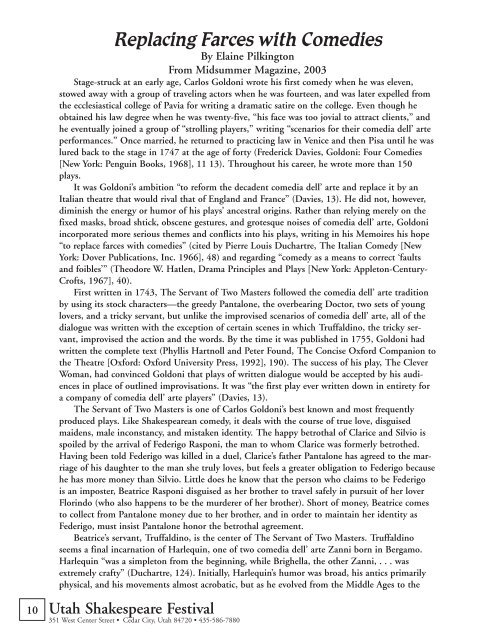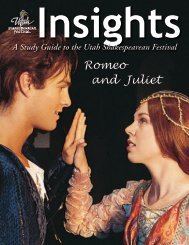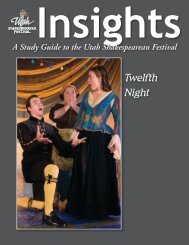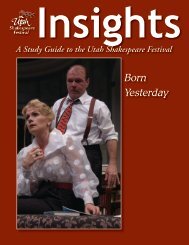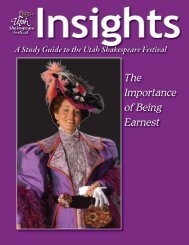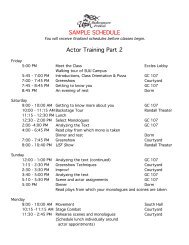The Servant of Two Masters - Utah Shakespearean Festival
The Servant of Two Masters - Utah Shakespearean Festival
The Servant of Two Masters - Utah Shakespearean Festival
Create successful ePaper yourself
Turn your PDF publications into a flip-book with our unique Google optimized e-Paper software.
10<br />
Replacing Farces with Comedies<br />
By Elaine Pilkington<br />
From Midsummer Magazine, 2003<br />
Stage-struck at an early age, Carlos Goldoni wrote his first comedy when he was eleven,<br />
stowed away with a group <strong>of</strong> traveling actors when he was fourteen, and was later expelled from<br />
the ecclesiastical college <strong>of</strong> Pavia for writing a dramatic satire on the college. Even though he<br />
obtained his law degree when he was twenty-five, “his face was too jovial to attract clients,” and<br />
he eventually joined a group <strong>of</strong> “strolling players,” writing “scenarios for their comedia dell’ arte<br />
performances.” Once married, he returned to practicing law in Venice and then Pisa until he was<br />
lured back to the stage in 1747 at the age <strong>of</strong> forty (Frederick Davies, Goldoni: Four Comedies<br />
[New York: Penguin Books, 1968], 11 13). Throughout his career, he wrote more than 150<br />
plays.<br />
It was Goldoni’s ambition “to reform the decadent comedia dell’ arte and replace it by an<br />
Italian theatre that would rival that <strong>of</strong> England and France” (Davies, 13). He did not, however,<br />
diminish the energy or humor <strong>of</strong> his plays’ ancestral origins. Rather than relying merely on the<br />
fixed masks, broad shtick, obscene gestures, and grotesque noises <strong>of</strong> comedia dell’ arte, Goldoni<br />
incorporated more serious themes and conflicts into his plays, writing in his Memoires his hope<br />
“to replace farces with comedies” (cited by Pierre Louis Duchartre, <strong>The</strong> Italian Comedy [New<br />
York: Dover Publications, Inc. 1966], 48) and regarding “comedy as a means to correct ‘faults<br />
and foibles’” (<strong>The</strong>odore W. Hatlen, Drama Principles and Plays [New York: Appleton-Century-<br />
Cr<strong>of</strong>ts, 1967], 40).<br />
First written in 1743, <strong>The</strong> <strong>Servant</strong> <strong>of</strong> <strong>Two</strong> <strong>Masters</strong> followed the comedia dell’ arte tradition<br />
by using its stock characters—the greedy Pantalone, the overbearing Doctor, two sets <strong>of</strong> young<br />
lovers, and a tricky servant, but unlike the improvised scenarios <strong>of</strong> comedia dell’ arte, all <strong>of</strong> the<br />
dialogue was written with the exception <strong>of</strong> certain scenes in which Truffaldino, the tricky servant,<br />
improvised the action and the words. By the time it was published in 1755, Goldoni had<br />
written the complete text (Phyllis Hartnoll and Peter Found, <strong>The</strong> Concise Oxford Companion to<br />
the <strong>The</strong>atre [Oxford: Oxford University Press, 1992], 190). <strong>The</strong> success <strong>of</strong> his play, <strong>The</strong> Clever<br />
Woman, had convinced Goldoni that plays <strong>of</strong> written dialogue would be accepted by his audiences<br />
in place <strong>of</strong> outlined improvisations. It was “the first play ever written down in entirety for<br />
a company <strong>of</strong> comedia dell’ arte players” (Davies, 13).<br />
<strong>The</strong> <strong>Servant</strong> <strong>of</strong> <strong>Two</strong> <strong>Masters</strong> is one <strong>of</strong> Carlos Goldoni’s best known and most frequently<br />
produced plays. Like <strong>Shakespearean</strong> comedy, it deals with the course <strong>of</strong> true love, disguised<br />
maidens, male inconstancy, and mistaken identity. <strong>The</strong> happy betrothal <strong>of</strong> Clarice and Silvio is<br />
spoiled by the arrival <strong>of</strong> Federigo Rasponi, the man to whom Clarice was formerly betrothed.<br />
Having been told Federigo was killed in a duel, Clarice’s father Pantalone has agreed to the marriage<br />
<strong>of</strong> his daughter to the man she truly loves, but feels a greater obligation to Federigo because<br />
he has more money than Silvio. Little does he know that the person who claims to be Federigo<br />
is an imposter, Beatrice Rasponi disguised as her brother to travel safely in pursuit <strong>of</strong> her lover<br />
Florindo (who also happens to be the murderer <strong>of</strong> her brother). Short <strong>of</strong> money, Beatrice comes<br />
to collect from Pantalone money due to her brother, and in order to maintain her identity as<br />
Federigo, must insist Pantalone honor the betrothal agreement.<br />
Beatrice’s servant, Truffaldino, is the center <strong>of</strong> <strong>The</strong> <strong>Servant</strong> <strong>of</strong> <strong>Two</strong> <strong>Masters</strong>. Truffaldino<br />
seems a final incarnation <strong>of</strong> Harlequin, one <strong>of</strong> two comedia dell’ arte Zanni born in Bergamo.<br />
Harlequin “was a simpleton from the beginning, while Brighella, the other Zanni, . . . was<br />
extremely crafty” (Duchartre, 124). Initially, Harlequin’s humor was broad, his antics primarily<br />
physical, and his movements almost acrobatic, but as he evolved from the Middle Ages to the<br />
<strong>Utah</strong> Shakespeare <strong>Festival</strong><br />
351 West Center Street • Cedar City, <strong>Utah</strong> 84720 • 435-586-7880


